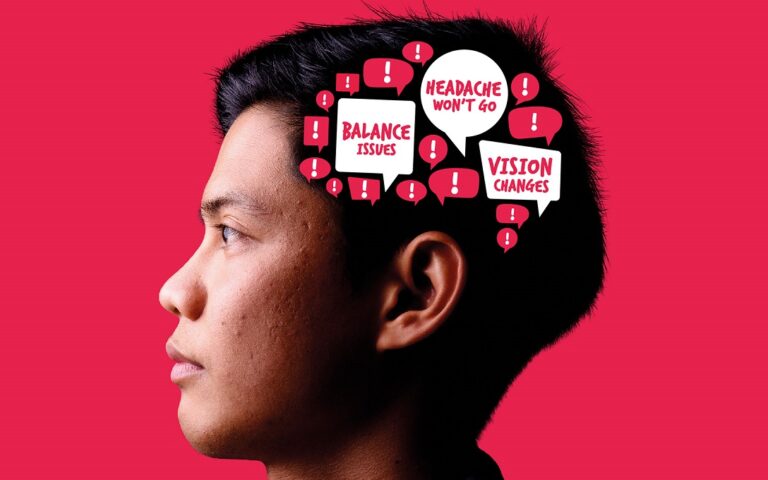Brain tumour symptoms in adults
Brain tumour symptoms in adults can include headaches, changes to vision and nausea. But, some of these symptoms can be caused by everyday things too.
Still, over 12,000 people in the UK are diagnosed with a brain tumour each year. So, while brain tumours are relatively rare, it’s still important to recognise the signs.
Click the links below to learn more about some of the brain tumour symptoms that adults can experience.
Get support
Reading about brain tumour symptoms can be scary, whether you’re having them yourself or you’re looking into them for someone you know. But, we’re here to help. If you need any more information or just someone to listen to you, get in touch with our kind and understanding support team.

Brain tumour symptoms

Headaches
Headaches are one of the most common symptoms of a brain tumour.

Changes in vision
Changes to vision can include blurred or double vision, abnormal eye movements and more.

Seizures
Seizures, sometimes referred to as ‘fits’, are one of the common symptoms of a brain tumour.

Nausea & dizziness
Nausea, as with headaches, may be worse in the morning or if you suddenly change position.

Tiredness
Tiredness is usually a later brain tumour symptom as the tumour grows and the pressure increases.

Loss of taste and smell
Although rare, loss of taste & smell can be linked with tumours in certain parts of the brain.
What causes brain tumour symptoms?
Some of the symptoms of a brain tumour can also be caused by other things, like being ill or dehydrated. It’s also good to remember that loss of taste and smell are symptoms of Covid.
So, if you are experiencing any of the following symptoms, don’t assume it’s because of a brain tumour. Scroll down to find out how to get your symptoms checked out.
Still, it’s important to be aware of the signs.
We go into more detail in the links above. But, some of the symptoms and causes of brain tumours in adults are:
Headaches
Headaches are often caused by pressure being created in the skull because of the brain tumour.
Changes in vision
Changes in vision can happen because of the optic disc becoming swollen, or because of pressure on the optic nerve.
Seizures
Seizures can happen when the brain tumour affects normal activity in the brain.
Nausea and dizziness
Brain tumours can make you feel sick or dizzy. This could be because of the added pressure in the skull or because of where they are in the brain.
Tiredness
Many people affected by brain tumours feel tired, and this can be made worse by stress. There is not necessarily a cure for fatigue, but it can be managed.
Loss of taste and smell
The location of a tumour in the brain can affect the senses of taste and smell. It could stop either one from working properly or affect both at the same time.
Cognitive changes
Brain tumours can, unfortunately, sometimes cause issues like trouble remembering things or personality changes. These can be caused by where the tumour is in the brain, swelling, certain medication, and the emotional aspect of being diagnosed.
Communication problems
A brain tumour can sometimes cause speech to sound slurred, slow, or difficult to understand. This depends on the type, size, and location of the tumour.

I think I have brain tumour symptoms, what do I do?
If you have one or more of these symptoms and you want to get them checked out, there are a couple of different routes you can take:
- Contact your GP
Your doctor will be able to arrange the right tests and get you checked for a brain tumour. See more about how to talk to your GP by clicking the link below.
- Get an eye test
Sometimes eye tests can actually discover brain tumours. See more about booking your eye test by hitting the button below.
- Go to A&E
If the symptoms are sudden or severe, you should go to your emergency department or call 999.